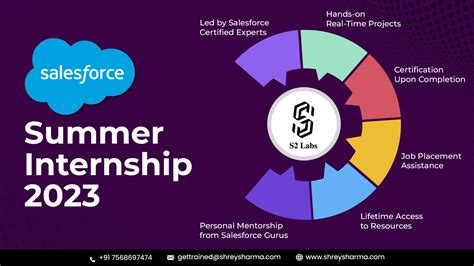A Competitive Advantage with Salesforce
In today’s competitive business landscape, it’s essential to have a strong understanding of cutting-edge technologies. The Salesforce platform has revolutionized the way businesses operate, offering a comprehensive suite of tools for customer relationship management (CRM), marketing automation, and analytics. As a Salesforce MBA intern, you’ll gain invaluable experience and skills that will set you apart in the job market.

In-Depth Training and Mentorship
Salesforce MBA interns participate in a comprehensive training program designed specifically for MBA students. This immersive experience provides you with a deep understanding of the Salesforce platform, including:
- CRM principles and best practices
- Sales Cloud, Service Cloud, and Marketing Cloud functionalities
- Data modeling and analytics techniques
- Cloud computing and security considerations
You will also be matched with a dedicated mentor, an experienced Salesforce professional who will provide guidance and support throughout your internship.
Real-World Projects and Responsibilities
As a Salesforce MBA intern, you will work on real-world projects that contribute directly to the company’s goals. These projects may include:
- Developing and implementing Salesforce solutions for client organizations
- Conducting data analysis and reporting
- Creating marketing campaigns and automating workflows
- Collaborating with cross-functional teams
Skills and Benefits
By completing a Salesforce MBA internship, you will develop a wide range of skills and experience that will enhance your career prospects, including:
- Technical expertise: Deep knowledge of the Salesforce platform and its capabilities
- Business acumen: Understanding of business processes and how Salesforce can support them
- Communication skills: Ability to effectively communicate technical concepts to both technical and non-technical audiences
- Project management skills: Experience in managing projects, coordinating with teams, and delivering results
- Problem-solving abilities: Capacity to identify and resolve complex business and technical issues
Industry Outlook and Career Opportunities
The demand for Salesforce professionals is growing rapidly. According to Gartner, the Salesforce market is expected to reach $97 billion by 2026, creating numerous job opportunities for talented individuals. Salesforce MBA interns are well-positioned to capitalize on this growth and pursue careers in:
- Salesforce consulting and implementation
- Business analysis and process improvement
- Marketing automation and digital marketing
- Customer success and relationship management
Tips and Tricks for a Successful Internship
To ensure a successful Salesforce MBA internship, consider these tips:
- Prepare thoroughly: Before starting your internship, familiarize yourself with the Salesforce platform and its capabilities through online courses or self-study.
- Be proactive: Take initiative in seeking out projects and responsibilities that align with your interests and career goals.
- Ask questions: Don’t hesitate to approach your mentor, team members, or other colleagues with questions.
- Network: Attend industry events and connect with other Salesforce professionals to expand your knowledge and build relationships.
- Stay updated: Salesforce is constantly evolving, so make an effort to keep up with new features, best practices, and industry trends.
Common Mistakes to Avoid
To avoid common pitfalls during your Salesforce MBA internship, keep these mistakes in mind:
- Lack of preparation: Failing to adequately prepare for your internship can hinder your progress and limit your learning opportunities.
- Passivity: Not taking initiative or seeking out challenges can result in a less fulfilling experience.
- Fear of asking questions: Asking questions is crucial for learning and development. Don’t hesitate to seek clarification or guidance when needed.
- Neglecting networking: Failing to connect with other Salesforce professionals can limit your exposure to industry insights and potential career opportunities.
- Ignoring industry updates: Staying up-to-date with Salesforce advancements is essential for maintaining relevance and competitiveness.
Tables for Decision-Making
The following tables provide a summarized overview of key information:
| Table 1: Salesforce Market Growth |
|—|—|
| Year | Market Size |
| 2021 | $54.8 billion |
| 2026 | $97 billion |
| Table 2: Salesforce Intern Skills |
|—|—|
| Skill | Description |
| Technical expertise | Deep knowledge of the Salesforce platform and its capabilities |
| Business acumen | Understanding of business processes and how Salesforce can support them |
| Communication skills | Ability to effectively communicate technical concepts to both technical and non-technical audiences |
| Project management skills | Experience in managing projects, coordinating with teams, and delivering results |
| Problem-solving abilities | Capacity to identify and resolve complex business and technical issues |
| Table 3: Salesforce Intern Benefits |
|—|—|
| Benefit | Description |
| Competitive salary and benefits | Compensation and benefits package commensurate with experience and industry standards |
| Mentorship and development | Dedicated mentor and structured training program to enhance skills and knowledge |
| Real-world experience | Hands-on involvement in projects that contribute to the company’s goals |
| Networking opportunities | Access to industry events and networking opportunities to connect with professionals |
| Career advancement | Opportunities for full-time employment and career growth within the Salesforce ecosystem |
| Table 4: Salesforce Intern Mistakes to Avoid |
|—|—|—|
| Mistake | Consequences |
| Lack of preparation | Hindered progress, limited learning opportunities |
| Passivity | Less fulfilling experience, missed opportunities |
| Fear of asking questions | Limited learning and development |
| Neg
